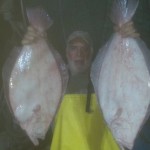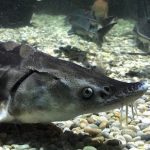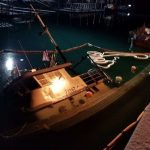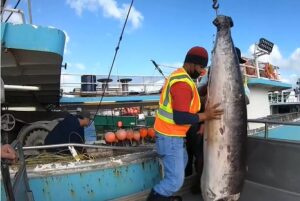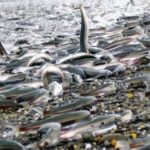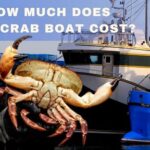Tag Archives: vessel monitoring systems
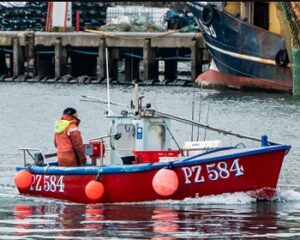
VMS a ‘perfect storm’ of red tape for small-scale fishermen in England
Vessel monitoring systems are an essential tool towards fully documented fisheries. Across the UK, the devolved nations worked in harmony over the past 20 years to install on vessels first over 24m, then 15m and finally over 12m vessels. But now, small scale fishermen with under 12m vessels in England say the long delayed roll out of the Government’s inshore vessel monitoring system is discriminatory and unfair to their class of vessel and has a timeframe that is impossible to comply with. Felixstowe Ferry fishermen James Whyte said, It’s just another example of the Government putting pressure on us to meet an arbitrary time frame we just aren’t ready for because of their delays and their shortcomings. In our area we often have to book technicians weeks in advance because we have none locally”. >click to read< 13:54
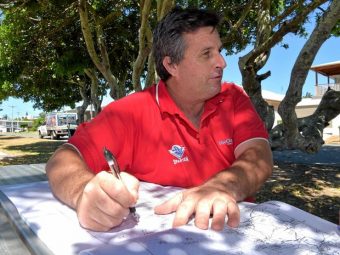
‘They want to track us like paedophiles’
Commercial line fishers say a plan to track their every movement on the water like they were paedophiles with ankle bracelets would cost them hard-won information and give away their competitive advantage. The Queensland Government was pushing to implement vessel monitoring systems by 2020 that would electronically record where all commercial fishers were operating at any time. Michael Thompson, one of only nine commercial line fishers still operating from Caloundra to Noosa, said existing government electronic platforms were not secure. He and colleagues fear fish grounds they have identified and harvested sustainably over decades would be exposed. >click here to read<20:55
Help stop “catch shares” and more in the South Atlantic
 Last year, the SAFMC promised that the Vision Project would be “stakeholder-driven” (click here, third paragraph) and conducted 26 “port meetings” that were supposed to seek stakeholder input into the project. These meetings produced overwhelming input from stakeholders, like you, that catch shares, vessel monitoring systems, and more closed areas like MPAs, are vehemently opposed, and should not be in the plan. Breaking its promise of a stakeholder-driven plan, the SAFMC has now included those overwhelmingly opposed measures in its Vision Project plan! Read the rest here 10:30
Last year, the SAFMC promised that the Vision Project would be “stakeholder-driven” (click here, third paragraph) and conducted 26 “port meetings” that were supposed to seek stakeholder input into the project. These meetings produced overwhelming input from stakeholders, like you, that catch shares, vessel monitoring systems, and more closed areas like MPAs, are vehemently opposed, and should not be in the plan. Breaking its promise of a stakeholder-driven plan, the SAFMC has now included those overwhelmingly opposed measures in its Vision Project plan! Read the rest here 10:30
Atlantic Highly Migratory Species; Vessel Monitoring Systems – HMS Webinar – Monday, September 23, 2013 1:00 PM – 3:00 PM EDT
 NMFS proposes to modify the declaration requirements for vessels required to use Vessel Monitoring System (VMS) units in Atlantic Highly Migratory Species (HMS) fisheries. This proposed rule would require operators of vessels that have been issued HMS permits and are required to use VMS to use their VMS units to provide hourly position reports 24 hours a day, 7 days a week (24/7). Additionally, these changes will continue to provide NOAA’s Office of Law Enforcement (OLE) with information necessary to facilitate enforcement of HMS regulations. This rule would affect all commercial fishermen who fish for Atlantic HMS who are required to use VMS. more here register for webinar here 12:59
NMFS proposes to modify the declaration requirements for vessels required to use Vessel Monitoring System (VMS) units in Atlantic Highly Migratory Species (HMS) fisheries. This proposed rule would require operators of vessels that have been issued HMS permits and are required to use VMS to use their VMS units to provide hourly position reports 24 hours a day, 7 days a week (24/7). Additionally, these changes will continue to provide NOAA’s Office of Law Enforcement (OLE) with information necessary to facilitate enforcement of HMS regulations. This rule would affect all commercial fishermen who fish for Atlantic HMS who are required to use VMS. more here register for webinar here 12:59
Louisiana Oystermen claim the state-mandated vessel monitoring systems installed on their boats are illegal and should be removed.
The oystermen say they are unable to disengage or power down the monitoring systems even when their vessels are not commercially taking oysters from Louisiana Department of Wildlife and Fisheries-managed and regulated public natural reefs or LDWF-designated oyster seed grounds. continued@theadvocate


































